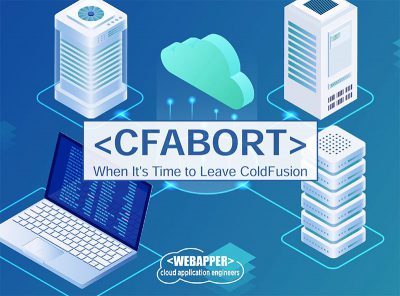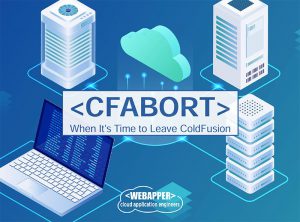Does Anyone Use ColdFusion Anymore?
The tools we use for software development continuously evolve, enabling developers to write efficient, effective code to address changing market needs. Choosing a development platform is challenging because each software development framework carries advantages and disadvantages. In the mid-90s, we began building websites using HTML and JavaScript, switching later to ASP and ColdFusion. In the 2000s we saw the rise of PHP and Ruby. In the 2010s, JavaScript and Python moved to the front. Each one of these platforms still has a presence online today, although they may have matured or declined over time. Since we have a long CFML pedigree (and occasionally controversial opinions on the subject), we wanted to address a question we’re asked regularly: does anyone use ColdFusion anymore?
The Release State of ColdFusion in 2023
It doesn’t seem that long ago that we explored the state of ColdFusion (it was 2021!). Not much has changed. The current ColdFusion version is Adobe ColdFusion (2021 Release), which officially released on November 11, 2020. The next major update is forthcoming – Adobe plans to release ColdFusion 2023 (AKA Project Fortuna) sometime in the first half of 2023. The ColdFusion 2023 Alpha version is ready for testing now. The emphasis of this release, aside from bug fixes, is additional support for Google Cloud Platform:
- GCP Storage
- GCP Firestore
- GCP PubSub
- Central Config Server
Apparently, ACF will retain its monolithic architecture.
ColdFusion, By the Numbers
W3Techs provides some interesting statistics about programming languages. Their crawling methodology indicates that ColdFusion is used by 0.3% of server-side programming languages for websites. In comparison, PHP powers 77.7% of server-side apps, although that number is expect to drive increasingly fewer new projects in the future. ASP drives 7.3%. According to an extensive 2022 programming survey, the JavaScript community holds over 17 million developers, making it the most popular programming language in the world. Zippia, an employment portal, reports that we have over 18,000 ColdFusion developers employed in the United States. Compare that with over 34,000 PHP developers. The takeaway here is that other development platforms enjoy much greater adoption. ColdFusion remains niche and is being used for fewer new initiatives.
ColdFusion vs. Lucee
Another element to ColdFusion adoption is the migration of CFML from ACF servers to open source Lucee. Having done a few ourselves, we know the financial benefits, especially in larger cloud environments, are substantial. Lucee isn’t stealing everything, but it provides further attrition to Adobe’s footprint and revenue. Who’s still paying license fees? In our experience, it’s government and large corporations who are the big spenders, and then small businesses — with little in between. Lucee is certainly a cost-effective alternative for any size application. It may require a modest investment in tinkering and testing, but it saves on license fees.
The Offramp Remains
A few ColdFusion stalwarts bristled at our article about leaving CF altogether. Truth be told, it’s been one of our most popular posts, which speaks volumes about market sentiment. Although we still actively host, maintain, and support many ColdFusion and Lucee systems, we expect to see increasingly fewer new projects using CFML in any form. The numbers don’t lie — so we’re focusing on starting new projects using cloud native, which doesn’t apply to CFML. We’ll keep engines running, applying the Strangler Pattern where possible and building new systems using APIs & microservices.
Does Anyone Use ColdFusion Anymore?
Short answer: yes, in limited fashion. Long answer: yes, but what we’ve been seeing for quite some time is a decline in popularity coupled with a modest investment by Adobe, creating a flywheel of decline. If over two years delivers a minor update as we’re seeing in 2023, the writing is on the wall. We’ll happily keep the lights on to preserve successful systems, but we’ll also guide others to true cloud native solutions. As ColdFusion nears its thirtieth birthday, the ones using it have done so for almost that long, making wonderful, fast, robust applications along the way. Today, though, times change faster than fast…




Leave A Comment